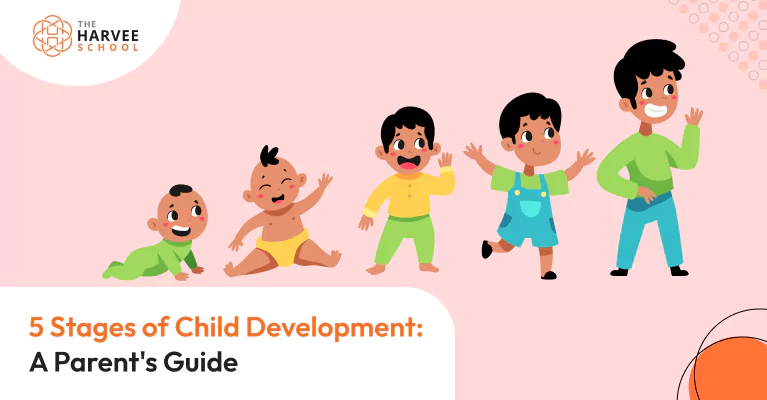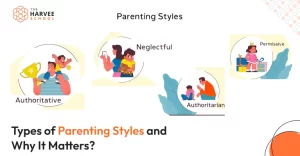5 Stages of Child Development: A Parent’s Guide
Have you ever felt that your kids are grown already?
As a parent, watching them develop quickly can be both exciting and overwhelming. From their first smile to their first steps, every milestone is a call for celebration.
But it’s also helpful to have an idea of what to expect at different stages of development so that you can best support them with their physical, emotional, and cognitive growth.
Here, we’ll walk through the critical stages of child development and highlight what you, as a parent, can do to encourage healthy growth.
5 Key Stages of Child Development
Children develop through these five broad stages: infancy, early childhood, middle childhood, adolescence, and young adulthood. These stages have significant milestones to achieve and can directly influence their physical, mental, and emotional capabilities.
1. Infancy (0-2 years)
Physical Development:
During infancy, your child will experience rapid physical growth. By the time they reach 5 months, babies usually double their birth weight, and by their first birthday, they often triple it. They also develop basic motor skills, such as lifting their heads, rolling over, sitting up, and eventually crawling. By the end of this stage, many babies can stand and may even take their first steps.
Cognitive Development:
Infants constantly absorb information from their environment. They develop basic problem-solving skills, like figuring out how to get a toy within reach. By around 12 months, babies start to understand object permanence (the idea that things still exist even when they can’t see them).
Emotional and Social Development:
This is the stage where babies begin to form attachments. They develop trust through consistent care and attention. Around six months, babies start to show social smiles. By one year, they may exhibit separation anxiety when away from their caregivers.
Parenting Tip:
Interact with your baby by talking to them, singing songs, and making eye contact. Provide a safe environment for them to explore, and make sure you respond to their needs consistently to build a sense of trust and security, as this stage is all about establishing it.
2. Early Childhood (2-6 years)
Physical Development:
Early childhood is a stage where children grow steadily and start their motor skills. They become more coordinated and can run, jump, throw, and kick. Fine motor skills are also developed in this stage. Encouraging them to draw, stack blocks, and use utensils can aid them.
Cognitive Development:
Early childhood years are a time of significant cognitive development. Children begin to use language more effectively and ask lots of “why” questions. They engage in symbolic play, meaning they start to use objects to represent other things (e.g., a stick becomes a sword). Memory and attention span also improve, but they are still quite limited.
Emotional and Social Development:
Children in this stage develop a sense of independence and begin to assert themselves. They also start to build friendships and understand concepts like sharing and empathy, though they might still struggle with these concepts. Temper tantrums and mood swings are common as they learn to manage their emotions.
Parenting Tip:
Encourage your child’s curiosity by answering their questions and introducing them to new ideas. Play together to develop social and motor skills and help them navigate emotions by modeling calmness and patience.
3. Middle Childhood (6-12 years)
Physical Development:
During middle childhood, children grow at a slower, steadier rate compared to earlier years. Their coordination and strength continue to improve, and they become more active. Fine motor skills, such as handwriting and using tools, also advance.
Cognitive Development:
This phase sets the stage for acting more logically and concretely. They can solve problems that involve basic reasoning and are capable of understanding more complex concepts like time, money, and distance. Their memory and attention span improve significantly, and they can follow multi-step instructions.
Emotional and Social Development:
Children develop a stronger sense of self and are more aware of how others perceive them. Peer relationships become more important, and kids start to form lasting friendships. They may experience increased self-consciousness, particularly around appearance or abilities.
Parenting Tip:
Nurture your child’s sense of independence by giving them responsibilities and encouraging decision-making. Encourage positive friendships and guide them in resolving conflicts. Be supportive as they navigate the social complexities of this stage.
4. Adolescence (12-18 years)
Physical Development:
Adolescence is marked by puberty, which brings rapid physical changes. Boys and girls undergo growth spurts and develop sexual characteristics. Adolescents experience significant hormonal changes, which can affect their mood and behavior.
Cognitive Development:
Teenagers develop abstract thinking skills. They begin to question the world around them, form their own beliefs, and become more concerned with identity and self-expression. Problem-solving skills are more sophisticated, and they can plan for the future in ways that younger children cannot.
Emotional and Social Development:
It is a time of intense emotional and social development. Adolescents strive for independence and often challenge authority. They are susceptible to peer influence and may experiment with different social roles or behaviors. Self-esteem can fluctuate as teens become more aware of their social standing and body image.
Parenting Tip:
Allow your teenager to gain more independence while maintaining open communication. Set clear boundaries, but respect their need for autonomy. Be supportive of their interests and identity exploration, and encourage healthy coping strategies for dealing with stress.
5. Young Adulthood (18-25 years)
Physical Development:
By the time young adults reach this stage, their physical development has largely stabilized. They are at their peak physical health, though habits developed during adolescence may influence their long-term health.
Cognitive Development:
Young adults continue to refine their problem-solving and critical-thinking abilities. They are better able to analyze complex situations and make independent decisions. They may also be pursuing higher education or entering the workforce, which can further expand their intellectual capacities.
Emotional and Social Development:
This stage is marked by greater emotional maturity. Young adults may start to form long-term relationships, both romantic and platonic, and begin to understand their place in the world. Career development and planning for the future become critical focuses.
Parenting Tip:
Encourage your young adult to make independent decisions while offering guidance when necessary. Be a sounding board for their ideas and challenges as they navigate this transition to full adulthood.
How Can You Contribute and Support?
Remembering each child’s development stages can benefit parents as you have the knowledge and insight on what’s about to happen in each stage. With this informed experience, you can help them navigate.
Be Patient:
Each child develops at their own pace. While it’s helpful to know what milestones to expect, don’t be overly concerned if your child hits some milestones early or late.
Provide a Safe and Stimulating Environment:
Children need a safe, secure environment to explore and grow. Encourage curiosity and expose your child to a variety of experiences and challenges.
Be Interactive:
Open, supportive communication is key to helping your child navigate their emotions and relationships. Listen attentively and acknowledge their emotions.
Set Realistic Expectations:
Adjust your expectations based on your child’s developmental stage. Understand their cognitive and emotional abilities and set appropriate challenges to avoid frustration.
Be Involved:
Your active participation in your child’s life helps build their confidence and supports healthy emotional and social development. Whether it’s through play, study, or simply spending time together, your involvement is crucial.
Final Thoughts
Child development is a continuous journey of growth and change. By understanding the typical stages of development, you’ll be better equipped to recognize milestones, support your child’s needs, and celebrate their unique path. Each stage presents new challenges and joys, but with the proper knowledge and support, you can ensure your child thrives at every age.






